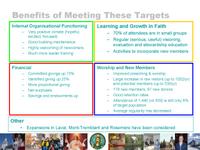My Key Concepts
The purpose of this blog is to promote discussion of some ideas which I think will promote
the development of first world churches, and through debate to improve those ideas. To follow the flow of my logic, read forward
from the first entry;
entries which form the cornerstones of my thought are flagged with "KEY--", and are listed below with a short summary of the key idea. Kindly share your suggestions and improvements with me, and I will adjust the contents accordingly.
Thank you for your participation! (Direct email contact is also welcome.)
- KEY--Why are congregations weak?
(Mostly due to defects in the culture of the judicatory: unclear mission/vision, ineffective structures, misaligned incentives, and lack of support, all of which lead to a low quality "product".) - KEY--Correcting diocesan weaknesses
(A summary explanation of what is involved in correcting those defects.) - KEY--Correcting the weakness of congregations
(How to move away from a "laisser faire" leadership style at the diocesan level in a way that has organisational legitimacy.) - KEY--Setting Targets (Overview)
(Dioceses now measure mostly finances and attendance, if they measure anything. Some suggestions on better measures which should have a cause and effect relationship towards wholistic growth, a Balanced Scorecard.) - KEY--Sample Benefits from a Balanced Scorecard
(Illustrating what wholistic growth would look like: much more than just more money or more people in church!) - KEY--Cause and Effect for Laurentian Congregational Revitalisation
(Shows the linkage between the different strategic activities in Laurentian churches, and growth in organisational, spiritual, financial and participatory health.)
Saturday, October 01, 2005
KEY--Sample Benefits from a Balanced Scorecard

There are two key benefits from taking a Balanced Scorecard approach. The first, which I will present in a later post (link), is that it forces us to think in terms of cause and effect: which key measurable activities are causes or at least predictors of the desired finalities? Secondly, it produces a healthy, balanced set of benefits. By contrast, putting the emphasis solely upon giving might produce good financial numbers but neglect the quality of worship or outreach. A "crass consumerist" approach, which worries so many in the mainline churches when they think about "seeker services", might conceivably boost attendance at the expense of watering down the faith.
In the example presented here, the results of our plan to revitalize the Laurentian Deanery should lead to largely positive outcomes in each of the four areas. Here are a few of the highlights:
- Internal Organisational Functioning: The principle increases should come in the area of improving the organisational climate of each of the congregations. This will be achieved through the promotion of a clear, positive, do-able vision and significantly increased leader training (as well as a process of on-going evaluation). The commitment of congregations to welcoming newcomers will be verifiably strong.
- Learning and Growth in Faith: More than three quarters of the number of attendees will be in small groups for faith-sharing and adult Christian education; this can't help but increase the dynamism of people's faith lives and boost the relevance of Sunday worship. We will regularly be investing significant amounts of time in visioning or mission planning, as well as in evaluating the effectiveness of our ministries and providing stewardship education.
- Worship and New Members: Sunday worship services are where we meet potential new members and show them the goodness and the power of God (including what he has done to change our lives). Here we expect to see improvements in the quality of preaching and worship, large numbers of new visitors (see the subsequent post on the three kinds of visitors), significant numbers of new members and new commited donors, and an attendance rate that has doubled. We can also predict that the regularity with which people attend will likely have dropped, as we move from having mostly "the oldest and most faithful members" to having a mix of newcomers and oldtimers.
- The rate of givings by committed givers will have risen, as will the average identified donation, and more of our members will be contributing aconsciously selected percentage of their income. More congregations will have surpluses, and savings and endowments will have risen.
There will be other positive side-effects, as well: clergy and lay leader attitudes and hopefulness should have improved dramatically as they regain a sense of their ability to influence their results and grow in skillfulness; the deanery will have become a cooperative unit, sharing funding on projects of mutual interest ( for example publicity, social action, youth ministries, large-scale rallies, and perhaps even new initiatives or church planting); the diocese's income will go up as congregational revenues go up; it will be much easier to recruit and retain highly competent clergy; and the "buzz" of taking a new approach to Christian ministry will attract those who wouldn't have given the Church the time of day.
There will also be negative consequences, which we are planning for in order to minimize their impact. If the rest of the diocese (or at least the Bishop) is not firmly on board, there will be conflicts and some undermining of our efforts. Undoubtedly, if this has any spiritual reality, there will be significant trials and temptations. Some will suspect that this is just another "top down", authoritarian approach, merely a "cash grab". There will be long and often obscure debates on the theology behind clarifying the organisational structure and the flow of accountability and responsibility....
| Copyright 2005, Mark Gibson (email at markagibsoncan@gmail.com) |